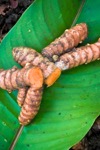| Scientific: | Curcuma longa |
|---|---|
| Other: | Turmeric |
| Family: | Zingiberaceae |
Turmeric is native to India where it is an essential herb in both Asian cuisine and traditional medicine. The rhizome is rich curcuminoids, most notably curcumin, that are responsible for the bright yellow colour of curries and most of the medical research focus on these compounds.
Turmeric has numerous medical actions, but it's primarily used as an anti-inflammatory and antioxidant. Research shows that turmeric and its active compound curcumin are as effective as anti-inflammatory drugs in the management of joint pain and osteoarthritis and have fewer side-effects. Also, this anti-inflammatory effect shows potential for treating neurodegenerative diseases, particularly Alzheimer's disease.
Historically, turmeric was used to treat inflammation and infections of the digestive tract. In addition to its anti-inflammatory actions, it possesses some carminative, antimicrobial and antiulcer effects. Both animal and human clinical trials show turmeric has promise in treating inflammatory bowel disease (IBD) with most of the studies showing improvement in ulcerative colitis.
Thousands of research studies have been published testing the effects of turmeric and curcumin against various types of cancers. Curcumin has been shown to induce apoptosis in a variety of cancer types and also has been shown to decrease the side-effects of certain types of chemotherapy. Numerous clinical trials show that turmeric improves outcomes with cancer patients.
Musculoskeletal
• arthritis
• osteoarthritis (OA)
• rheumatoid arthritis (RA)
• osteoporosis
• plantar fasciitis
Gastrointestinal
• poor digestion (abdominal pain, bloating, cramping)
• dyspepsia
• colic
• irritable bowel syndrome (IBS)
• inflammation and catarrh of the alimentary tract
• gastritis
• peptic ulcer (H. pylori)
• infectious diarrhea
• ulcerative colitis
• inflammatory bowel disease (IBD)
• HIV-associated diarrhea
• diverticulitis
Hepatobiliary
• atonic biliary conditions
• cholestasis
• cholelithiasis (gallstones)
• cholecystitis
• biliary dyskinesia
• non-alcoholic fatty liver disease (NAFLD)
Cardiovascular
• hyperlipidemia
• atherosclerosis
• coronary artery disease
• stroke
Infection
• bacterial
• viral
- Epstein-Barr virus (EBV) - mononucleosis
• fungal (candidiasis)
Dermatologic
• fungal infections (dermatophytes)
• Tinea pedis
• viral infection
• herpes simplex virus (HSV)
• bruises
• psoriasis
Nervous
• neurodegenerative disorders
• Parkinson's disease
• Alzheimer's disease
• multiple sclerosis (MS)
• carpal tunnel syndrome*
Cancer
• prostate cancer
• breast cancer
• ovarian cancer
• multiple myeloma
• pancreatic cancer
• colon cancer
Endorine
• pancreatitis
Gynecological
• endometriosis
• Antiinflammatory
• Antirheumatic
• Carminative
• Anticancer
• Antioxidant
• Antispasmodic
• Antiemetic
• Vulnerary
• Hepatoprotective
• Antiseptic
• Antimicrobial
• Antiviral
• Antithrombotic
• Polyphenols (E.g. Curcuminoids: Curcumin)
• Essential Oils
• Liquid extract (1:1 45% EtOH): 1-3 tsp tid
• Decoction (dried herb): 1-2 tsp qd
• Pregnancy: Safe when consumed as directed.
• High doses: May relax lower esophageal sphincter (LES) tone and lead to heartburn (e.g. GERD, reflux); due to carminatives.
- Iron supplements • may reduce the absorption of non-heme iron. Take iron supplements a few hours apart.
• Blood thinners • turmeric may affect the blood's ability to clot, and could interfere with antiplatelet a
Barnes J, Anderson LA, Phillipson JD. Herbal Medicines, 3rd ed. London: Pharmaceutical Press, 2007.
Bone K. Principles and Practice of Phytotherapy. Edinburgh: Churchill Livingstone, 2000.
Bone K. A Clinical Guide to Blending Liquid Herbs: Herbal Formulations for the Individual Patient. St Louis, MO: Churchill Livingstone, 2003.
Brinker F. The Toxicology of Botanical Medicines, 3rd ed. Sandy, Oregon: Eclectic Medical Publications, 2000.
Felter HW, Lloyd JU. King's American Dispensatory. 1898. http://www.ibiblio.org/herbmed/eclectic/kings/main.html. Accessed: August 19, 2006.
Hoffman D. Medical Herbalism. Rochester, Vermont: Healing Arts Press, 2003.
Weiss RF. Herbal Medicine. Beaconsfield, England: Beaconsfield Publishers Ltd, 1988.
Williamson EM, ed. Major Herbs of Ayurveda. Edinburgh: Churchill Livingstone, 2002
Smith TJ, Ashar BH. Iron Deficiency Anemia Due to High-dose Turmeric. Cureus. 2019 Jan 9;11(1):e3858. doi: 10.7759/cureus.3858. PMID: 30899609; PMCID: PMC6414192.
Disclaimer: This content is subject to change. The information is intended to inform and educate; it does not replace the medical evaluation, advice, diagnosis or treatment by a healthcare professional. www.nhpassist.com © 2014 NDAssist Inc. and/or its affiliates. All rights reserved.

|
Turmeric
SummaryTurmeric is native to India where it is an essential herb in both Asian cuisine and traditional medicine. The rhizome is rich curcuminoids, most notably curcumin, that are responsible for the bright yellow colour of curries and most of the medical research focus on these compounds. IndicationsSign in requiredActionsSign in requiredConstituentsSign in requiredPosologySign in requiredSafetySign in requiredInteractionsSign in requiredReferencesSign in required |
|---|